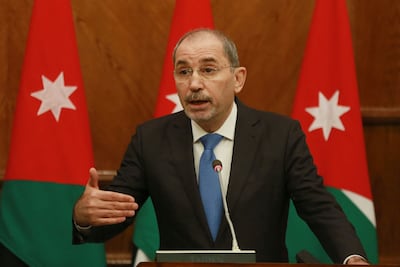“A new security architecture for the Middle East” was the title of a session on the second day of the annual meeting of the World Economic Forum.
The title was promising, with the potential to carve out a new way forward for the region, and yet it was inevitably caught up in the realities on the ground.
The tone of the session could not be more different than that of the previous day, which was entitled “The economic outlook of the Middle East”.
While discussions on security are often more dire than economic ones, the difference in tone between the two was also marked.
While discussing the economy, opportunities such as the green transition, technological development and the region’s youth were all mentioned by the panellists.
When asked about what opportunities there are for the region, the Saudi Finance Minister, Mohammed Al Jadaan beamed and responded: “Our youth … and technology."
In the session on security architecture, topics such as Iran’s rocket attacks on Iraq, continued Palestinian occupation and the topic of refugees did not give much room for hope.
Responding to a question on whether re-establishing ties with Syria’s President Bashar Al Assad was “a good thing", Jordanian Foreign Minister Ayman Al Safadi responded: “I know what isn’t a good thing, and that is maintaining the status quo” in Syria.

When asked about whether peace with Israel was possible, Saudi Arabia’s Foreign Minister Prince Faisal bin Farhan stressed the importance of peace once the Palestinian conflict was resolved, reminding the audience of the Saudi-sponsored Arab peace initiative in 2001.
His answer was that of a diplomat, but also indicated how one of the oldest conflicts of the region remains in crisis without a clear way out.
A decade ago, Davos was buzzing with discussions about “change in the Middle East”, with new personalities taking centre stage talking about change tied largely to politics.
A decade on, the Middle East is no longer taking centre stage; with the Ukraine war top of mind, in addition to economic woes facing the world.
However, the real change is that Arab ministers are discussing economic opportunity, gender parity and scientific advancement.
While most of the ministers are from the GCC and Egypt, the sense that stability can lead to innovation and growth is evident.
However, those who continue to suffer from war or displacement, outside of Europe, were even more absent from this year’s annual meeting.


